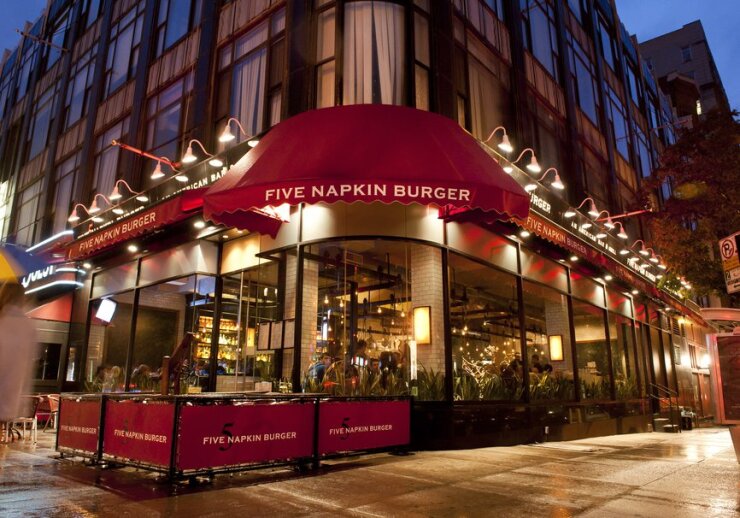Like all
The pandemic changed a lot about how people make payments — and crucially, it changed when they pay. Instead of waiting for a check at the end of a meal, many patrons pay up front through a mobile ordering app. Currently, about 80% of the 5 Napkin Burger's transactions are made from QR codes on a mobile device.
"It would be helpful if the payment experience could be tied to the vaccine checks," said Robert Gaurino, the restaurant chain's CEO. "Even with something as simple as takeout we still have people coming into the restaurants. It's a challenge to eliminate face-to-face interaction while improving user experience and to comply with the new requirements."
The added task of checking vaccine status strains a restaurant workforce that is already stretched thin. "There are times when you can't forecast demand with as much accuracy as we would like, and there have also been labor shortages," Gaurino said.

5 Napkin Burger uses the hospitality technology firm Bbot to support digital ordering and payments. The product does not handle vaccine checks, but other payment companies are hard at work on meeting this need. Mastercard, for example, is involved with at least two initiatives.
A global effort
In Australia, EML Payments this week introduced a vaccine verification process and incentive marketing program that instantly issues a digital prepaid card for use anywhere on Mastercard's merchant network. The vaccine verification is tied to EML's app. EML did not respond to a request for comment.
The card network and ICC are working with the Good Health Pass Collaborative, an international group that promotes the sharing of coronavirus vaccination and testing information in an effort to develop standards. The Good Health Pass Collaborative includes Hyperledger, IBM and dozens of other organizations that work on blockchain and digital ID projects, such as JPMorgan Chase and American Express. Chase and Amex did not return requests for comment. Mastercard referred questions to the ICC.
The ICC supports the work of the Good Health Pass collaborative and other organizations such as the World Health Organization, International Civil Aviation Organization and the EU to create digital health passes for the broader population, said Dawn Chardonnal, an ICC spokesperson.
"We are stressing the importance of this initiative whenever we have a chance, especially with governments and international organizations," Chardonnal said in an email.
Linking payments or point of sale technology to health passports will be a tough task, with politics perhaps being a larger hurdle than technology development.
"Even with the mandates coming into play now, it will take time for merchants and businesses to enforce these measures," said Inci Kaya, a senior analyst covering health insurance and payments for Aite-Novarica. The lack of technology is not the primary problem keeping financial services and payment companies from more widely using digital ID for health passes and to authenticate payments, Kaya added.
The government requirements that are designed to force merchants to adopt vaccine passports for entry, or to tie proof of vaccination to a point of sale process, vary wildly from state to state, partly because of political differences. Vaccines and other coronavirus prevention measures such as mask mandates are
"Without a common standard it is a pretty challenging task for anyone to connect the dots from the vaccine passports to a transaction system," Kaya said.
How it would work
Several countries have introduced digital health passes to enter businesses and facilities.
In Israel, the "
In New York, the state's
"These systems are creating new digital IDs expressly for the purpose of vaccine ‘passports,’ " said Avivah Litan, a vice president at Gartner Research who specializes in artificial intelligence and blockchain. "But once these IDs and apps are set up they can extend to other uses, like a financial wallet or education credentials."
"It would make sense for companies involved in digital payment transactions, touchless payments, consumer credit, credit scoring and consumer spending to get their hands around this," said Kaya.
Diners' choice
While all businesses have had to adjust during the pandemic,
Adding health passes to the mix creates an additional challenge.
"Restaurants were already dealing with difficulties hiring and retaining staff, and now they’re being asked to take on a new task of monitoring vaccination status," said Miles Skorpen, vice president of product and design for OpenTable. "This means many restaurants might need to have a full-time employee at the door checking vaccination statuses, just like many bars have had bouncers checking IDs for years."
OpenTable, which has
A "verified for entry" status clears diners at restaurants for repeated visits, and restaurants can advertise this capability. OpenTable has partnered with digital ID company CLEAR to allow diners to create virtual vaccine cards that can link to the rest of a restaurant's order and pay workflow.
"The pandemic made the entire industry more willing to experiment with new methods of payment. Many diners like the idea of minimal human interaction at a restaurant, and new payment options help facilitate that," Skorpen said.
At 5 Napkin Burger, Gaurino wants vaccine passports to be handled through the same payment systems that patrons are already comfortable using. "Our goal is to have the guest power the experience," he said.





